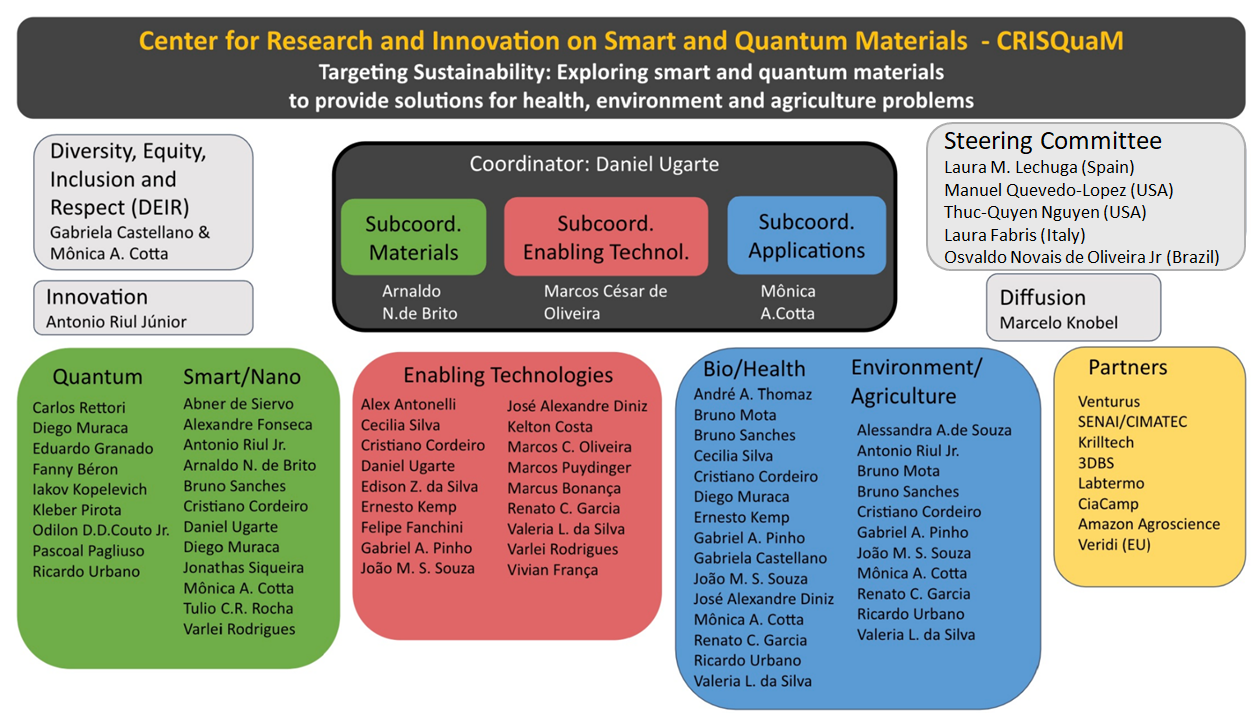BV-FAPESP: research projects supported in this Center
CRISQuaM in the Media: news about the center
CRISQuaM aims to explore the synergistic development of fundamental and applied science to create new materials with high potential for the construction of devices and sensors to address technological challenges related to sustainability, climate change, precision agriculture, ecology, and health. To achieve these goals, we have assembled an interdisciplinary and collaborative research team, integrating expertise across various scientific domains, researching novel materials with high innovation potential. By combining original synthesis methods, advanced characterization techniques, theoretical approaches, computational simulations, quantum technologies, and device construction designs, we aim to drive advances in smart and quantum materials, promoting scientific excellence and technological development. With this, we plan disruptive innovations in instrumentation—including hardware and AI-based tools—as well as in quantum technologies, biomedical devices, and signal processing, in addition to plant bionics, exploring plant-pathogen interactions. Besides research activities, we plan intensive actions in education, dissemination, and communication for the general public, as a modern society should be aware of the challenges humanity faces and how research and technology are essential for responsibly utilizing the planet's limited resources. CRISQuaM's Innovation activities are accelerated through partnerships with several companies in related technologies, many of them Brazilian. Finally, all activities of the Center are managed in accordance with diversity, equity, and inclusion goals and best practices.
The Center brings together scientists, engineers, and innovators in a collaborative effort to apply materials science and quantum technologies at the cutting edge, designing new materials and nano(bio)sensors for advanced diagnostics. The Center has a team capable of producing a wide range of (nano/micro) materials, along with precise chemical and physical characterizations using modern techniques (synchrotron, advanced microscopy, magnetotransport, magnetic resonance, optics, etc.). In addition, the team offers various options in enabling technologies, including miniaturization, processing, and additive manufacturing, as well as instrumentation, quantum sensing, and electronics development. Data analysis will employ updated approaches (numerical simulation, classical and quantum machine learning, and quantum optimization). Applications at the knowledge frontier will address urgent sustainability needs in environmental areas, precision agriculture, plant bionics, and biomedical interfaces, contributing to the development of local technologies in close partnership with the Brazilian industry.
The organization of the Center is based on three pillars — Materials, Enabling Technologies, and Applications — together with partner companies, as described in the figure below.

2025-04-30
Analysis of the gut microbiota of more than 700 babies also showed that breastfeeding was a protective factor, mitigating the problem in those who consumed industrialized products. The study underscores the importance of breastfeeding and avoiding foods high in sugar, saturated fat, salt and chemical additives.
2025-04-30
Through experiments with mice, scientists from the State University of Campinas have shown that physical activity induces immune cells involved in the inflammatory process to acquire an anti-inflammatory profile. The finding opens the way to new therapeutic approaches.
2025-04-30
The samples were taken from the bottom of a lake in the Ipiranga Fountains State Park. The analysis showed a strong correlation between industrialization, population growth and increased concentrations of pollutants.
2025-04-30
A study conducted at the Federal University of São Paulo compared the performance of people diagnosed with primary progressive aphasia and healthy individuals, identifying the main tasks that can signal the presence of the syndrome.
2025-04-23
In an article in Nature Sustainability, researchers from Brazil and the United States point out the advantages of fish farming over livestock farming, but warn of the need for stricter environmental regulations to prevent the activity from becoming an additional pressure on the biome.
2025-04-23
This is the finding of a study that followed 352 pairs of newborns and their mothers in the cities of Guarulhos and São Paulo (Brazil). Changes observed in the first two months of life may increase future risk of obesity and diabetes.